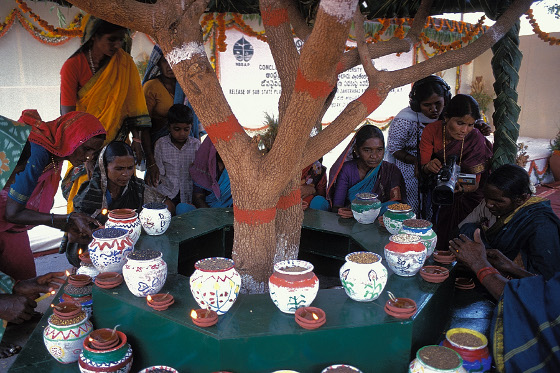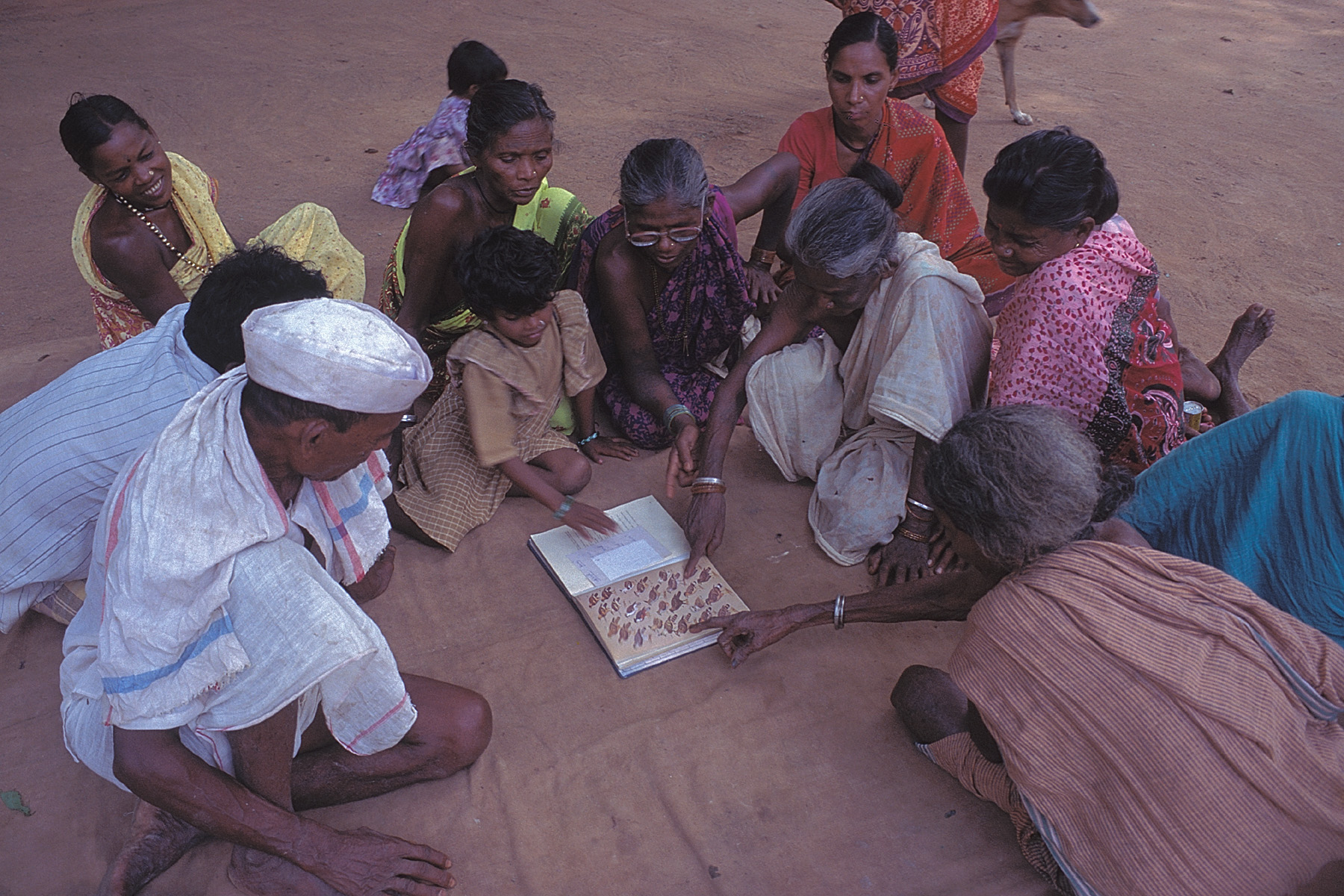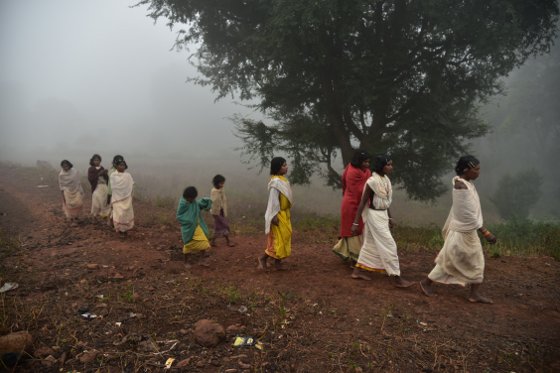‘Our government is in Mumbai and Delhi, but we are the government in our village’, Mendha-Lekha village, Maharashtra.
‘These hills and forests belong to Niyamraja, they are the basis of our survival and livelihoods, we will not allow any company to take them away from us’, Dongria Kondh adivasis (indigenous people), Odisha.
‘Seeds are the core of our identity, our culture, our livelihoods, they are our heritage and no government agency or corporation can control them’, Dalit women of Deccan Development Society, Telangana.
These three assertions of ‘ordinary’ people in different parts of India suggest the basis of a radical deepening of democracy.

Women of Deccan Development Society celebrating seed diversity. PIc: Ashish Kothari
Powerful signs at the grassroot
About 30 years ago the Gond adivasi residents of Mendha-Lekha, in Gadchiroli district of Maharashtra state, adopted the principle of decision-making by consensus at the full village assembly. The villagers do not allow any government agency or politician to take decisions on their behalf, nor may a village or tribal chief do so on his/her own. This is part of a ‘tribal self-rule’ campaign underway in some parts of India, though few villages have managed to achieve complete self-rule (swaraj, an Indian concept we discuss below).
A struggle in the 1980s against a major dam that was to displace Mendha-Lekha and dozens of other villages highlighted the importance of self-mobilisation. Since then the village has conserved 1800 hectares of surrounding forest, and recently gained full rights to use, manage, and protect it under the Forest Rights Act 2006, reversing centuries of colonial and postcolonial forest governance. The community, now, meets its basic needs in terms of food, water, energy and livelihoods through, among other things, the sustainable harvesting and sale of bamboo.

Mendha Lekha villagers discussing wildlife in their forests. Pic: Ashish Kothari
In 2013 all the village landowners decided to place their lands in the ‘commons’, effectively ending private land-ownership, using the long-forgotten Gramdan Act of 1964. Decisions at the village assembly are taken on the basis of information generated by abhyas gats (study circles) on a host of topics, in which villagers combine their own knowledge and wisdom with the knowledge of civil society organisations (CSOs), academics and government officials who are sensitive to the villagers’ worldview.
Detailed resource mapping and planning with the help of CSOs, which ensure that earmarked government budgets are spent in line with community priorities, are being conducted where villages have established their rights under the Forest Rights Act, or the Panchayat (Extension to Scheduled Areas) Act, or similar state legislation in Maharashtra, Gujarat, and other states. Similar initiatives have been taken at some urban or larger levels, too.
In the state of Nagaland, a government initiative called “communitisation” has devolved aspects of decision-making regarding health, education and power (e.g. salaries and transfers of teachers) to village and town communities.
Cities such as Bengaluru and Pune are exploring participatory budgeting, entitling citizens to submit their spending priorities to influence the official budgets. Civil society groups see it as a step towards decentralising urban governance.
These acts of reconfiguration and reconstruction run parallel to an equally strong trend towards resistance to the mainstream economy and polity. The second of the statements at the start of this essay comes from the adivasi group, Dongria Kondh of Odisha, which opposed the proposed bauxite mining venture of a UK-based transnational corporation (TNC) Vedanta in the sacred, and economically and culturally strategic hills where they live.
Dongria Kondh women of Denguni village, Niyamgiri. Pic: Ashish Kothari
When the state gave its permission for the corporation to begin mining, the Dongria Kondh, supported by civil society groups, took the matter to various levels of government, the courts, and even Vedanta shareholders in London!
The Indian Supreme Court ruled that as a culturally important site for the Dongria Kondh, the government required peoples’ approval, a crucial order that established the right of consent (or rejection) to affected communities, somewhat akin to the global indigenous peoples’ demand for ‘free and prior informed consent’ (FPIC) now enshrined in the UN Declaration on the Rights of Indigenous Peoples.
The Dalit women farmers of Deccan Development Society in Medak district of Telengana have countered their socially oppressed status by achieving a remarkable revolution in sustainable farming, alternative media, and collective mobilisation. Where once they were shunned as Dalits, marginalised as women, and poverty-stricken as marginal farmers with few productive assets, they are now assertive, self-confident controllers of their own destiny, having achieved full food sovereignty using local seeds (especially millets) and inputs, produced their own visual and audio media, and advocated for local to global policy change.
Representative Democracy to Radical Democracy
Radical initiatives like those mentioned above are naturally confronted by an entrenched power dynamic threatened by any possibility of change. In fact, the Indian representative democracy also continues largely to support the existing power equation and its socio-economic iniquities. Discrimination and violence against the weaker sections of society persist while the traditional sources of their livelihood, as well their arts and crafts are dying a speedy death because of liberalization. Moreover attempts at decentralization or devolution of administrative, legal and financial power are, mostly, either derailed or compromised.
What, then, is the way out of the doldrums and shambles the vast majority of India’s population finds itself in? Radical democracy, inspired by Mahatma Gandhi’s idea of swaraj (or self-rule), is a promising attempt at forging a new direction. It aspires to locate political power at the smallest unit of collective decision-making (beyond the individual family) – the village, the urban neighbourhood, the educational institution, the CSO – where people can meet face to face.
Based on the ideal of local self-reliance for survival and livelihoods, it integrates the spiritual, ethical, economic, social and political domains in useful and viable ways. At larger scales, it is about the interconnections between such basic political units at greater geographical and thematic scales in ways that hold such institutions accountable to the grassroots. At an even more complex level, it is about the democratization of economic relations too, and of a host of other imperatives such as social justice and equity, and ecological sustainability.
Moving beyond the local
If the egalitarian idea of power and direct democracy could be located in the smallest decision making units, it can also be scaled up to tackle the macro issues confronting the world today – climate change, desertification and pollution.
Landscape and trans-boundary planning and governance (also called ‘bioregionalism’, or ‘ecoregionalism’, among other terms) are exciting new approaches being tried out in several countries and regions. These are envisaged as clusters or federations of villages and towns with common ecological features. These are as yet just about finding roots in India, but some are worth learning from. For a decade, the Arvari Sansad (Parliament) in Rajasthan brought 72 villages together to manage a 400 sq. km river basin through inter-village coordination, making integrated plans and programmes for land, agriculture, water, wildlife, and development.
In the state of Maharashtra, a federation of Water User Associations manages the Waghad Irrigation Project, the first time a government project has been completely devolved to local people. This has led to a much greater emphasis on equity in water distribution and access, and greater possibility of public monitoring, compared to more centralised irrigation governance systems.
While rural and urban communities will be the fulcrum of alternative futures, the state will continue to have a critical supporting and enabling role in the near future. It needs to retain, or rather strengthen, its welfare role for historically or newly marginalised sectors, support communities where local capacity is weak, regulate and hold liable businesses or others who behave irresponsibly towards the environment or people. It will have to be held accountable for its role as guarantor of the fundamental rights that each citizen is supposed to enjoy under the Constitution of India.

Over time, however, national boundaries would become far less divisive and important in the context of genuine globalisation. The increasing networking of peoples across the world, both traditional and digital, is already a precursor to such a process. Cultural and ecological identities that are rooted in the people or community to which one belongs and the ecoregion where one lives, as well as those being formed through digital media, may gain in importance, defined by celebrating diversity, with the openness to mutual learning and support.
The most essential condition for these radical changes to have stability and longevity would be that representatives are accountable across all levels of decision-making. Their obligations would include highly constrained ‘delegated’ responsibility whereby representatives are subject to clear mandates given by the delegators or electorate rather than attaining independent power, they can be recalled and must report back, among other responsibilities.
Power is not only political: towards eco-swaraj or radical ecological democracy
A radical redistribution of political power can be effective only if it is accompanied by the restructuring of economic and social power relations. Economic democratisation will entail changes in many aspects: the relations of producers with their means and modes of production, robust producer–consumer links and the transformation of both producers and consumers into “prosumers”, progressive localisation of economic activity relating to the meeting of basic needs such that clusters of settlements can be relatively self-reliant or self-sufficient, encouragement of non-monetised or local exchange systems for products and services, and fundamental changes in macroeconomic theory and policy.
Localised economies formed around clusters of rural (or rural and urban) areas are taking shape in various parts of the country, in which all or most basic needs are produced and exchanged locally, reducing dependence on outside state or market systems. These include the successful initiatives of the former dalit sarpanch of Kuthambakkam village, Ramaswamy Elango, and the organisation Bhasha working in adivasi areas of southern Gujarat.
An increasing number of companies and cooperatives, run democratically and with the ability to gain some level of control over the market, now exist in India, such as Dharani Farming and Marketing Mutually Aided Cooperative set up by the Timbaktu Collective in Andhra Pradesh, the textile producer company Qasab and others in Kachchh, Gujarat, and the SWaCH cooperative of wastepicker women in Pune, Maharashtra.
Finally, and as a base for the above, there is an urgent need to move towards ecological sustainability. No amount of restructuring of power relations will work in the long run if the very ecological foundations of life are undermined; by the same token, the protection of these foundations also requires that people at the grassroots can take power into their own hands.
Combining these elements there emerges a framework of an alternative future, called eco-swaraj or radical ecological democracy (RED). The notion is conceptually simple but functionally complex: a process or system in which every person and community is empowered to be part of decision-making, in ways that are ecologically sustainable and socially equitable. It is based on the pillars of ecological sustainability and resilience, social justice and equity, direct democracy, economic democracy and localisation, and cultural diversity.
Pathways into the future
The introduction of RED in India or elsewhere is obviously not going to be easy as the entrenched ruling elite exercises domination through various time-tested tactics, including violence, and will continue to counter any threat to its survival. In recent times it has come down heavily on civil society, using arbitrary powers to cancel registrations or licenses. The most glaring is the continuing attack on Greenpeace India, whose funds have been frozen by the Ministry of Home Affairs for “irregular activities”, while it is clear that the State feels threatened by the group’s effective campaigning against coal mining and thermal power stations.

Vikalp Sangam meeting at Timbaktu. Pic: Ashish Kothari
However, in the face of severe discrimination, exploitation and violence hundreds of acts of resistance and rebellion are going on at any given time, against land grabs, forest diversion, displacement, caste and gender-based violence, arbitrary exercise of power in academic institutions, unemployment and underpayment, corruption, the political–business nexus, scarcities of water and food, government attempts to curb freedom of speech and dissent, and so on. These movements and groups stand on the cusp of an alliance-forming moment, which they need to seize.
On 2 December 2014, some 15000 to 20000 people from formations working on the rights of peasants, fishers, industrial workers, adivasis, waste pickers, street hawkers, children, women, and the rights to health, education, livelihoods, and the environment rallied in Delhi and pledged to join hands to defeat the entrenched power elite.
They came together under the slogan ‘abki baar hamara adhikar’ (‘this time around, our rights’). While no formal alliance was announced, the movements agreed to continue working together on these issues. Whether such an informal alliance will last remains to be seen. Already platforms like the National Alliance of Peoples’ Movements (NAPM), one of the core organisers of the rally, suggest the beginnings of a broader coalition of change-makers. Out of the breakdown of the Aam Aadmi Party has also emerged a fledgling mobilisation called Swaraj Abhiyan which has promised to avoid the pitfalls of centralised power that AAP succumbed to.
But beyond building resistance movements, there is also what these moments and movements produce, based on practice and exploration, to envision what a sustainable, equitable and just India would look like. A process of bringing together people working on such alternatives, Vikalp Sangam (‘Alternatives Confluence’), hopes to provide inputs for such envisioning.
Starting in 2014, several regional Sangams have been held and several more are coming up; thematic Sangams on issues such as energy, learning and education, youth needs and aspirations, urban sustainability and equity, and knowledge democracy, are being planned; and these will ideally coalesce in a series of national Sangams over the next few years. Through all this, a framework like eco-swaraj or Radical Ecological Democracy could become the ideological catalyst for this alliance.

